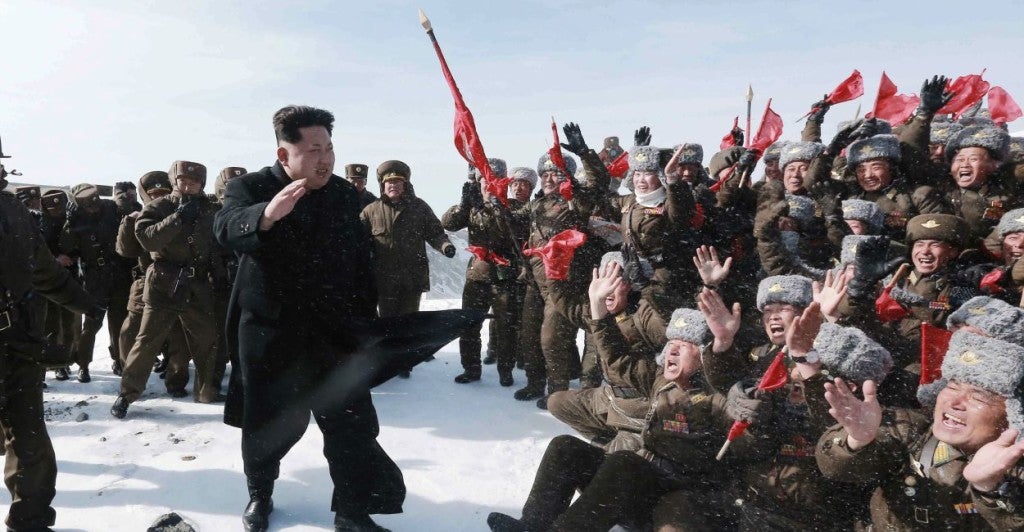For decades, the U.S. and other nations have engaged in negotiations to achieve North Korean denuclearization.
Pyongyang signed several agreements promising never to build nuclear weapons and then several more pledging to give up the weapons it agreed to not build in the first place.
North Korean leader Kim Jong-un now rejects dialogue with the “mad dogs” of Washington. Pyongyang is equally dismissive of engaging with Seoul.
While frustrating, the negotiations with North Korea provide some valuable hard-earned lessons that should be kept in mind when assessing the recent multilateral nuclear deal with Iran.
1. Violations Make a Shaky Foundation for Negotiations
Nuclear diplomacy with North Korea and Iran was precipitated by their violating previous agreements and U.N. resolutions—hardly the basis for confidence they will abide by yet more accords.
2. Don’t Do Your End-Zone Dance Too Early
Clinton administration officials initially claimed that the 1994 Agreed Framework had solved the North Korean nuclear problem.
It was later confirmed that Pyongyang had already begun a uranium-based nuclear weapons program even before it signed the Agreed Framework.
That uranium program violated its existing commitments to the U.N. Non-Proliferation Treaty, International Atomic Energy Agency Safeguards Agreement, the inter-Korean denuclearization agreement, and then the Agreed Framework.
3. A Bad Cop Is Good to Have
The Agreed Framework was not the immaculate diplomatic conception that its supporters claim. Talk of war with North Korea was rife in the mid-1990s, and Clinton administration officials claim they were debating attack options when surprised by a preliminary agreement midwifed by a rogue Jimmy Carter.
Israel’s threats of attack similarly focused Tehran’s leaders on the penalties of defiance.
4. Even a “Final” Agreement is Never Final
Vague text allows countries to cheat while still semi-legitimately claiming compliance.
Like a good defense lawyer, Pyongyang used ambiguity to obfuscate and avoid punishment.
To prevent a crisis and collapse of negotiations, policymakers become willing to negotiate away previous resolutions, treaties, and even their laws, or simply to not enforce them.
5. Verify, Verify, Verify
President Ronald Reagan’s dictum “Trust but verify” was reflected in the extensively detailed verification protocols that enabled the United States to have arms control treaties with the Soviet Union.
Precisely defining verification mechanisms, including short-notice challenge inspections of non-declared facilities, are critical for ensuring the long-term viability of an agreement.
6. Arms Control Advocates Reject Evidence of Cheating
Pyongyang serially deceived, denied, and defied the international community.
Yet arms control proponents responded to growing evidence of North Korean cheating by doubting, dismissing, deflecting, and eventually dealing.
These “experts” initially rejected intelligence reports of North Korea’s plutonium weapons program, its uranium weapons program, and North Korean complicity in building a Syrian nuclear reactor. Nowadays, they downplay North Korea’s steadily increasing nuclear and missile capabilities.
7. Evidence of Cheating Doesn’t Arrive Gift-Wrapped
After decades of debating whether Iran even had a nuclear weapons program, experts now claim that the Iranians are two months away from threshold and that U.S. intelligence will now be able to quickly and unequivocally identify cheating and then convince U.S. policymakers and U.N. representatives to re-impose sufficient penalties to prevent Iran from developing nuclear weapons, all within one year.
8. The International Community Doesn’t “Snap Back”
The U.N. has shown a remarkable ability to emit a timid squeak of indignation when its resolutions are blatantly violated, and then only after extensive negotiations and compromise.
Hampered by Chinese and Russian obstructionism, the U.N. Security Council has been limited to lowest-common-denominator responses.
9. Be Wary of the Administration’s Promises to Increase Pressure
Obama claims that North Korea “is the most isolated, the most sanctioned, the most cut-off nation on Earth.”
That is simply not true. The Obama administration has been pulling its punches toward North Korea by not even fully implementing existing U.S. law.
Washington has imposed measures on other countries that it has not levied on North Korea. The U.S. has even sanctioned twice as many Zimbabwean entities as North Korean.
Despite years of promising additional pressure on North Korea, the Obama administration continues its policy of timid incrementalism, including no action against North Korea’s “crimes against humanity.”
10. Negotiations Allow Inching Across Redlines
Alternating provocative behavior and a willingness to negotiate enabled North Korea to manipulate the international community into timidity about imposing penalties and acquiescence to repeated violations.
By maintaining strategic ambiguity on their nuclear programs, Pyongyang and Tehran, like the proverbial camel’s nose under the tent, are gaining international acceptance of activities that were previously declared “unacceptable.”
Proponents of the Iran deal dismiss criticisms that it allows Tehran nuclear capabilities precluded by successive U.N. resolutions.
They argue that it is unreasonable to expect Iran to give up capabilities that it has devoted great resources as well as national pride to develop.
If nuclear negotiations were to resume with North Korea, Pyongyang would cite the Iran precedent and demand terms far less restrictive than current U.N. resolutions call for.
